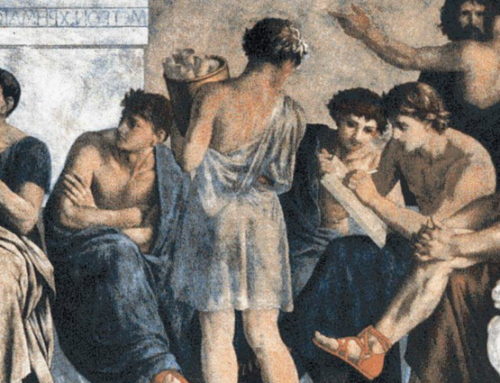 A skill is an “ability to do something well; expertise.” Surely we would greatly desire that after 13 years in the custody of the public schools that our children would emerge in possession of the requisite skills to function adequately in civilized society. And while the attainment of skills is a good thing, and our desire to instill skills in our young is well-intentioned, it is unlawful folly to make “skills” the focal point and end of our educational planning. It demonstrates a lack of understanding of the human person and a confounding of the very means and ends of an authentic education.
A skill is an “ability to do something well; expertise.” Surely we would greatly desire that after 13 years in the custody of the public schools that our children would emerge in possession of the requisite skills to function adequately in civilized society. And while the attainment of skills is a good thing, and our desire to instill skills in our young is well-intentioned, it is unlawful folly to make “skills” the focal point and end of our educational planning. It demonstrates a lack of understanding of the human person and a confounding of the very means and ends of an authentic education.
My friend Michael Verlander, an exceptional classical educator at Holy Spirit in Atlanta, compares modern education and classical education thus: modern education is like pouring information into a bucket and classical education is like cultivating a rose bush. The modern teacher concerns himself with the attainment of skills and knowledge collected in the bucket of the student’s mind. Questions of pedagogy revolve around contriving methods of filling the bucket and weighing the contents. The classical educator sees that the bloom of the rose is the final end, but does nothing like give his student a rose petal. Rather, the concern is with tilling the soil, planting the right seeds, providing water, sunlight, pulling the inevitable weeds, and preparing for the miracle of the bloom, which results inalterably in perfect accord with the quality of material, diligence of labor, and consistency of conditions.
The difference between the two methods is stark, but in spite the obvious value of the one over the degeneracy of the other, the confusion of this age has corralled consensus into an advocacy for a pedagogical pigsty. The modern “experts,” the public school teachers, and even the majority of private school educators espouse the dreadful bucket method and eschew the classical method as “antiquated,” patriarchal, and useless, because it is concerned with the inner cultivation and at a glance appears to have no applicable use or immediate earning potential. For generations the public schools have churned out society’s citizens who embrace, promote, and swear by the corrupting methods of modern education. Ask someone educated (or rather not educated at all, but who was present) in the public schools if they received a good education they will often say in ignorance of their ignorance “why, yes I did.”
The utilitarian movement advanced by Bentham and Mill in the early 19th century had irrevocably permeated educational philosophy by the beginning of the 20th century. Industrialization and urbanization radically changed the landscape of civilized society and progressive educators began to see the schools as a practical means to solve social problems. The temptation is understandable, but really quite illicit concerning the dignity of human souls and edification.
The classical understanding of education, which views the human person in his entirety as body, mind, spirit and soul made in the image and likeness of God, had to be dramatically altered to consider meeting the practical material needs of society steeped in modernist political thought and bursting with labor demands. The schools were complicit in precipitating the divorce between the human person and moral agency. The new paradigm of the public school inculcated by John Dewey and his ilk effectively ended several millennia of ordered and authentic education, education that demonstrably built up Western Civilization. Its malevolent doppelganger, the modern public school promulgating empty skill sets, breaks civilization down more effectively than lost wars.
The modern notion of education, which has been divorced from all real notions of a true education, can be called “standards based” because it is grounded in what is called “mastery learning.” The idea is to master certain skills and develop tests to measure mastery, thereby filling the bucket and demonstrating measurable teaching methods.
By appearances, this method appeases the sightless criticality of the public eye, but still, its survival depends on semantic distortion and propaganda as bread and circuses to keep the masses pacified, for clearly it is by the belly that the masses judge. The preponderance of evidence overwhelmingly signals the utter failure of modern education; there is not a single marker to indicate otherwise except for the false words of educational experts. Yet we are like a snake eating its own tale, the hunger for true human cultivation outweighs the horrid reality that we are feeding on empty provender in a vain effort to stave off implacable intellectual starvation.
The charlatans who design the useless standards based programs are committed to backwards planning. For an example, if we examine a human who is actually literate we can empirically observe certain characteristics and attributes they possess, such as prosody, an understanding of figurative language, familiarity with literary devices etc… And what the classical educator understands is that these skills are fruits from the labor of cultivated literacy by the acquisition of the intransitive arts of grammar, logic, and rhetoric. The fraudulent educator tries to take those fruits and make them roots, in other words, the real ends of literacy are confused as means and the attempt to use acquired skills (ends) as a means to acquire that same skill renders the effort ineffectual and empty at best. At worst it is a violence against truth that may render students permanently illiterate.
The modern educational effort is to contrive artificial ways for students to focus on the acquisition of attributes and ends of literacy instead of cultivating the intransitive arts which comprise the means that enable the ends of literacy to bloom like the rose. The classical educator is focused on cultivating the three liberal arts for this rightfully ordered purpose. The modern educator is trying to impart an increasing number of already countless and empty skills. It is interesting to note that a human in possession of well cultivated grammar and logic possesses them for life. The literacy skills continually yield fruit from the well-kept inner orchard. While on the other hand, public school students may evidence that they have acquired any number of skills temporarily, but because they possess these skills as fruit plucked from the tree and as good as pilfered because it was not grown by their own labor, the fruits inevitably rot in the barren inner field because there is no source of renewal.
The unperceived truth is that a classically trained student in possession of the virtues will easily and quickly acquire the skills necessary to master any vocation for which he is suited, from a sanitation engineer to a rocket scientist. By converse, the publically educated student will generally be unable to use any of the empty skills that had been foisted into his bucket, for if they were ever of any use, they have long since faded from an atrophied memory. It is a tremendous irony that utilitarian education ends up being useless. Sadly, anything the modern student is able to do after being subjected to the horrific empty skills training of the public schools is based solely on his surviving innate abilities and the quality of his family, both of which will have suffered to some degree by the degeneracy flowing from the public schools.
Public education is a sacred cow for the American people and words against it draw vociferous, ill-weighted, and ill-placed defense, even from places you might never suspect. But the fact is that the public schools have been in a degenerating state of free-fall for many decades. The standards and curricula are fatally and irrevocably flawed. The fraudulent experts behind designing the state standards education have been trying to perfect the art of creating and inculcating an enormous amount empty skill sets. They have been largely successful. Terrifyingly, the Common Core intends almost exclusively to fill unfilled buckets with empty skills. Hardly a new contrivance, the Common Core is the same old tortured educational art form writ large.
Books on the topic of this essay may be found in The Imaginative Conservative Bookstore.







Interesting article, although Dr. Kirk used to take the discussion further. He taught us that the goal of public education was originally to teach people to read so they could read scripture and become good. Thus being good was the primary purpose of the first public schools in America. Today the public are taught that there is no truth but without objective truth there can be no objective good. What substitutes for the good is compliance with the State and not rocking the boat with dangerous ideas. Of course Christian thought teaches us that there is God’s truth and that our views are merely different lenses trying to see the reality. But take that out of the schools as well and you have a system that is merely a poor quality jobs council that is failing to even give urban children the ability to read. The answer is to get colleges and universities to once again embrace the search for truth. That will lead to a better qualified graduate and ultimately trickle down to improving students. However, the reality is not everyone can be educated despite what the NEA wants us to believe instead of setting the bar higher we are lowering it
Any books recommended for using the classical education method in homeschooling?